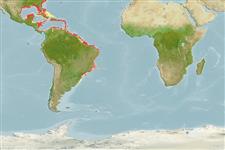Environment: milieu / climate zone / depth range / distribution range
Ökologie
seewasser riff-verbunden; tiefenbereich 10 - 45 m (Ref. 58018). Tropical; 34°N -
Western Atlantic: South Carolina and northern Gulf of Mexico in USA to northern South America; absent from Bahamas and West Indies.
Size / Gewicht / Alter
Maturity: Lm ? range ? - ? cm
Max length : 7.5 cm TL Männchen/unbestimmt; (Ref. 7251)
Occurs mainly on seagrass beds. Found from shore to 45 m depth. Synchronously hermaphroditic.
Life cycle and mating behavior
Maturities | Fortpflanzung | Spawnings | Egg(s) | Fecundities | Larven
Robins, C.R. and G.C. Ray, 1986. A field guide to Atlantic coast fishes of North America. Houghton Mifflin Company, Boston, U.S.A. 354 p. (Ref. 7251)
IUCN Rote Liste Status (Ref. 130435)
Bedrohung für Menschen
Harmless
Nutzung durch Menschen
Tools
Zusatzinformationen
Download XML
Internet Quellen
Estimates based on models
Preferred temperature (Ref.
123201): 22.6 - 27.7, mean 24.9 °C (based on 214 cells).
Phylogenetic diversity index (Ref.
82804): PD
50 = 1.0000 [Uniqueness, from 0.5 = low to 2.0 = high].
Bayesian length-weight: a=0.00490 (0.00200 - 0.01202), b=3.12 (2.91 - 3.33), in cm total length, based on LWR estimates for this (Sub)family-body shape (Ref.
93245).
Trophic level (Ref.
69278): 3.4 ±0.5 se; based on size and trophs of closest relatives
Widerstandsfähigkeit (Ref.
120179): hoch, Verdopplung der Population dauert weniger als 15 Monate. (Preliminary K or Fecundity.).
Fishing Vulnerability (Ref.
59153): Low vulnerability (10 of 100).
Nutrients (Ref.
124155): Calcium = 149 [79, 335] mg/100g; Iron = 0.869 [0.418, 1.669] mg/100g; Protein = 17.9 [16.0, 19.7] %; Omega3 = 0.125 [0.066, 0.247] g/100g; Selenium = 30.1 [12.3, 69.8] μg/100g; VitaminA = 148 [40, 580] μg/100g; Zinc = 1.93 [1.16, 3.04] mg/100g (wet weight);
